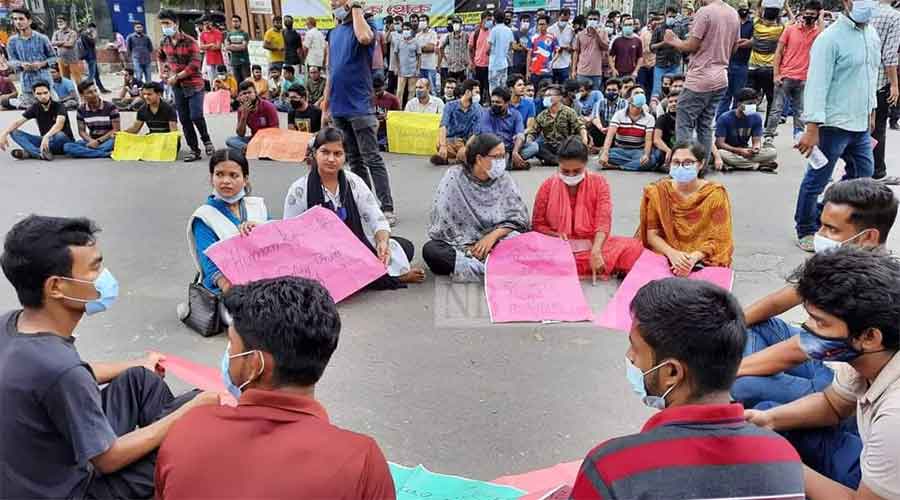Shahbag Square in Dhaka sprang back to life on Monday as thousands cutting across religions trooped down to the seat of protest in the Bangladesh capital to raise their voice against the attack on Hindu temples, Durga pandals and homes and shops belonging to the Hindu community in the past few days.
Not once but twice on Monday, demonstrations rekindled memories of February 2013 when Shahbag Square drew international attention as the epicentre of a protest against fundamentalist forces in Bangladesh.
In the afternoon, a 1,000-plus congregation, including students of Dhaka University and monks of Iskcon and the Ramna Kali temple, blocked the crossing for five hours. In the evening, marchers with torches staged a demonstration.
“Scores of Muslim brothers and sisters either joined the protest or pledged support to our cause. This is the beauty of a secular and inclusive Bangladesh,” said Joyjit Dutta, a Dhaka University student and a spokesperson for the protesters who had assembled in the afternoon.
Dutta hails from Cumilla, where the attacks began on Ashtami when rumours of alleged blasphemy, spread on social media, prompted some zealots to attack local temples and Durga pandals.
Over the past few days, the attacks have spread from one district to another and reports of clashes — resulting in at least six deaths, according to official sources — have come from Chandpur, Chattogram, Cox’s Bazar, Bandarban, Moulvibazar, Gazipur, Chapainawabganj, Feni and several other districts.
On Monday afternoon, after laying siege to the crossing for five hours, the mostly young protesters left around 3pm following requests from law-enforcement agencies. They vowed to return to the same venue after 24 hours if the Sheikh Hasina government failed to meet their seven demands, including the arrest and “highest punishment” of those behind the attacks on Hindu temples, homes and businesses across Bangladesh.
Those who gathered in the evening said they would return to the venue on October 20 with a much bigger turnout and hold a slew of programmes across the country to protest the rise of fundamentalist forces.
The two congregations were at best a trickle compared with the turnouts the square had witnessed in the past, but the gatherings were significant in view of the recent developments in Bangladesh, a Muslim-majority country tied to the principle of secularism.
Imran H. Sarkar, a prominent face of the Shahbag movement of 2013, was at the forefront in the evening. “We will not let Bangladesh be taken over by zealots.... The government has to take stern measures,” Sarkar said.
“This was the first day of our programme.... It will be bigger in the coming days,” Dutta said.
Despite the deployment of additional security personnel in 22 districts and a strong message by Hasina that the attackers would not be spared, more than 90 houses were vandalised and 25 homes belonging to Hindus were torched in Rangpur’s Pirgonj on Sunday night following rumours that a local Hindu youth had made a blasphemous post on Facebook.
Bangladesh home minister Asaduzzaman Khan told reporters on Monday afternoon that the government would rebuild the homes and compensate the losses suffered by the victims.
But the visuals of the attacks came as a surprise to scores of Bangladeshis, from all religions.
“All these deserve unequivocal condemnation. Such acts of arson were not witnessed even after the Babri mosque demolition in 1992.… This is not the Bangladesh for which we fought against Pakistan in the War of Liberation (1971). I fought for an inclusive and non-communal Bangladesh, but if that has not happened, my purpose is defeated,” said Shamsher Mobin Chowdhury, a decorated war veteran and a former foreign secretary.
Several prominent Bangladeshis this correspondent spoke to over the phone echoed these feelings and expressed dismay at the attacks that have continued over the past few days amid allegations that the law-enforcement agencies did not act promptly despite repeated requests for protection from the victims.
The attacks have come as an embarrassment for the Hasina-led Awami League, with the Opposition in Bangladesh and a section of civil society contending that the attacks could not have continued without support from the ruling party.
The Awami League has accused the Opposition alliance of the BNP and the Jamaat-e-Islami of masterminding the attacks to create communal tension in the country.
Sources in the ruling party said the government realised the damage the attacks could cause and had drawn up a plan -- following a meeting between Hasina and senior party colleagues on Monday evening -- to handle the situation politically.
“Our party will observe harmony gatherings and peace marches across the country on Tuesday.... Information minister Md Hasan Mahmud will visit Rangpur tomorrow to meet the victims. Soon, our leaders will travel across the country with the message of peace,” Biplab Barua, office secretary, Awami League, said on Monday evening.
Realising that the attacks on minorities will shift the focus from Bangladesh’s success story as a burgeoning economy, the government is organising a briefing with diplomats in Dhaka on Tuesday that would be addressed by junior foreign minister Shahriar Alam.
The damage-control measures by the government, a senior journalist said, are likely to bring the situation under control.
“Now that the government has woken up, there will be a temporary calm, but the attacks in different parts of Bangladesh will resume after a few months,” said the journalist, who did not wish to be named.
“Over the past 10 years or so, the attacks during Durga Puja have become an annual feature. Most of the time, the attacks begin with allegations of blasphemy and later it is found out that it was only a rumour. Unless the perpetrators of the attacks are given exemplary punishment, this will never stop.”











